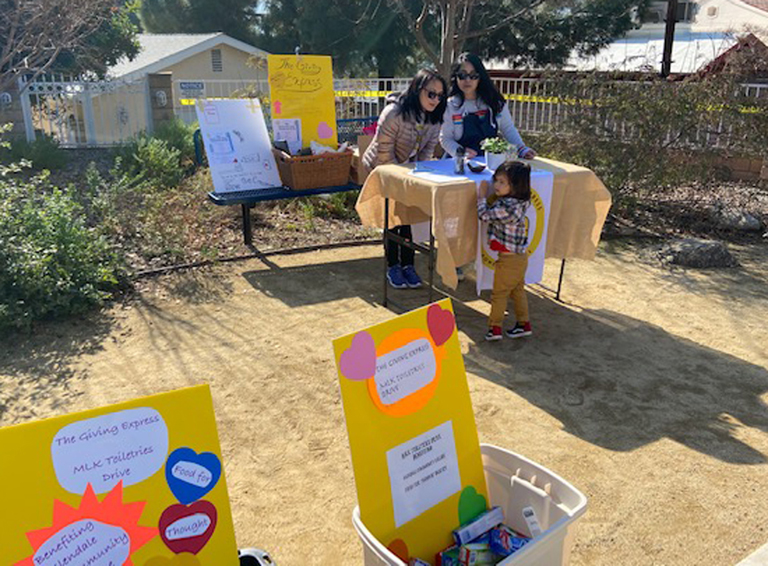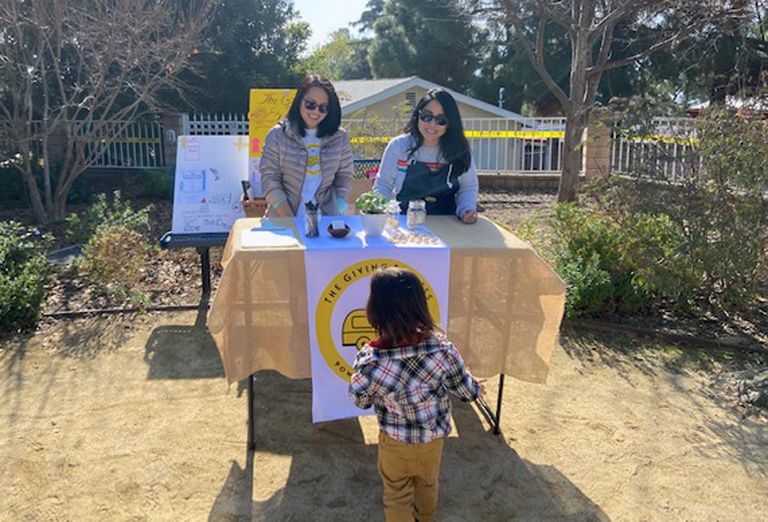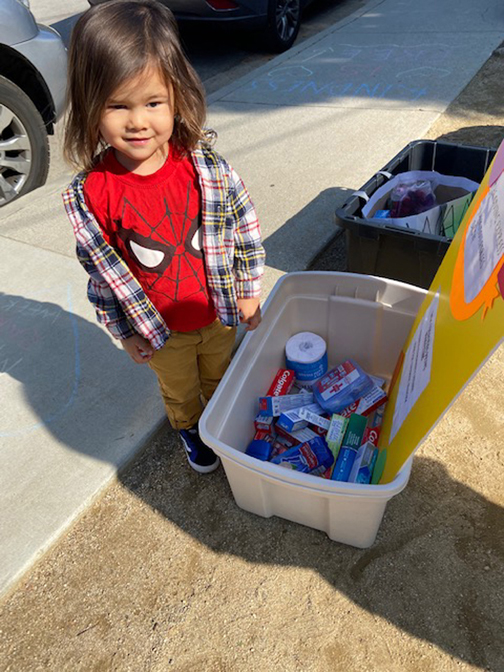
The Giving Express collects toiletries for the Glendale Community College Food For Thought Pantry. Donations were dropped off at the Crescenta Commons on Wednesday. From left, Trang Spero and Miho Tyszka, members of The Giving Express, accept donations from Max Fontanilla, who celebrated his third birthday by helping with donations.
By Mary O’KEEFE
Most know that college is a big step for many students and their families. It is a bridge between school and true adulthood. It is a time for students to work on their future as they prepare for the next step in life – a working career.
There is a change for students from the high school routine that includes being more independent in how they tackle their studies; however, there are also more consequences and, in fact, more is at stake. But the everyday world does not end when they go to college. Many have to get a job to help support themselves as they go to classes, which is a job in itself. Imagine, though, that in addition to working and going to school they find they do not have enough money for food. Imagine going to class and trying to concentrate on your future when all you can think about is the ever-present empty feeling in your stomach?
That is what some students across the nation are facing.
“Those [who] are working at a job can’t believe they are in this situation. They have a job and still can’t make ends meet,” said Ellen Oppenberg, Glendale Community College coordinator of Volunteers and Outreach for the Food For Thought Pantry.
While in a public school, students in need can get free or reduced cost breakfast and lunch; however, that is not offered in college.
GCC has a governance process in place that includes members of its faculty. A few years ago the members began hearing rumors of students who were homeless and hungry.
“We knew we needed to create a committee to address the [problem],” Oppenberg said.
They began looking into the issue in spring 2016 and by the fall the Food For Thought Pantry was up and running.
“We started seeing there was a big need for this,” she said.
Oppenberg added that it is not a difficult process for students to take part in the Food For Thought Pantry. The college does not require that students state they are homeless. They do not want to shine a light on the students as they go through some difficult times; they just want to help them in a respectful way.
“The only thing the students have to do is be actively enrolled and taking courses at GCC,” she said. It doesn’t matter how many units the students are taking.
Oppenberg said the community has been very supportive of the Pantry allowing the school to stretch beyond the existing program.
“We go beyond [the pantry] to provide food cards,” she said.
Oppenberg meets with students one-on-one to talk to them and find out what else they need, what else the program can do to help.
With the cost of living so high in the state, many students have more than one job to try and meet expenses but are still unable to make ends meet, especially if they have to cover housing as well as day-to-day costs.
In October the program was able to have a Los Angeles Food Bank truck in the school’s parking lot filled with food and supplies.
“Anyone could come to get food, [whether] faculty or students,” she said. “Four hundred and fifty people went through that line in October.”
The services provided by the LA Food Bank are not free to the college; part of the funds raised for the pantry go toward programs like the food bank truck.
But hunger is not the only issue facing students today. Homelessness is another growing problem.
“At our president’s [Dr. David Viar] urging we have formed a basic needs committee that is charged to see what else we can do,” Oppenberg added.
She repeatedly praised the community for its support for the Food For Thought Pantry. For example, The Giving Express has been working with local students to gather toiletries needed for the pantry. The Kiwanis Club of Glendale is also a strong supporter of the Pantry. Trader Joe’s of Montrose also makes deliveries through the week to the Pantry.
As the need continues to grow so does the support from the community.
Anyone who would like to support the Food For Thought Pantry can visit www.glendale.edu and search for the food pantry, or email Ellen Oppenberg at elleno@glendale.edu or call GCC at (818) 240-1000.


